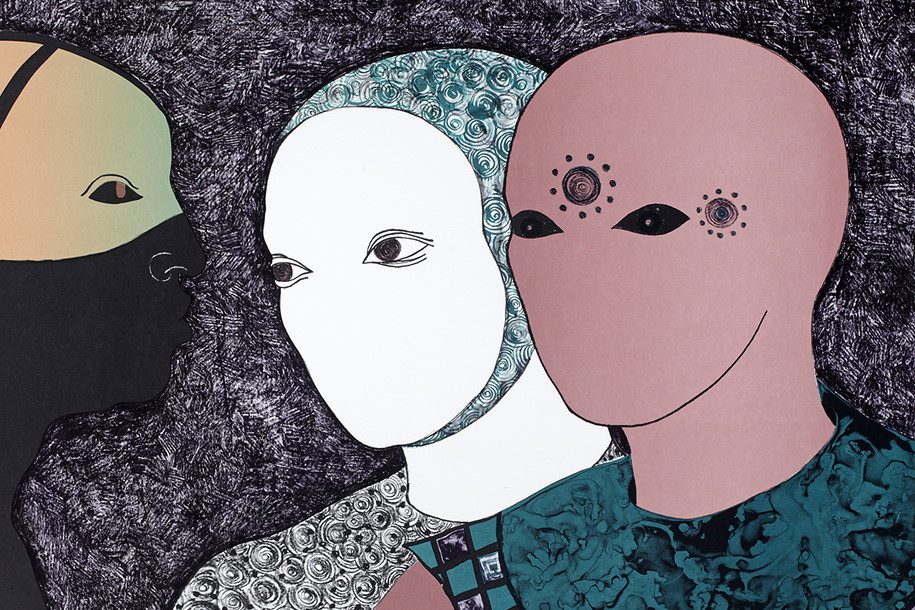Allen Memorial Art Museum at Oberlin College, Oberlin, OH, United States
20 Aug 2019 - 24 May 2020

Belkis Ayón, Manso, 1999. Offset lithograph. Allen Memorial Art Museum, Richard Lee Ripin Art Purchase Fund, 2018.1.
On August 20, 1619, “20 and odd” Africans disembarked the English warship White Lion at Point Comfort, Virginia Colony. This date is often invoked as the precise starting point of the “peculiar institution” of slavery in the United States, despite the fact that neither slavery as a legal institution, nor the United States as a defined body, existed at that time. On this contested 400-year anniversary, the Allen Memorial Art Museum (AMAM) at Oberlin College presents Afterlives of the Black Atlantic. Curated by Andrea Gyorody and Matthew Francis Rarey, the exhibition examines the connections and separations forged across what has become known as the Black Atlantic, a term coined by scholar Paul Gilroy.
Starting in the 15th century, the slave trade transformed the Atlantic Ocean from a formidable barrier into an unprecedented highway for forced human dispersal and cultural reinvention. In the largest forced migration in human history, ships transported 12 million captive Africans across the Atlantic—not counting the millions who perished on the journey. In the Americas, nearly 80 percent of all new arrivals before 1820 were born in Africa, while in Africa, stark population loss radically altered local societies. “But Africans have always had a strong impact in the new places they found themselves,” said Matthew Rarey. “Enslaved peoples’ intellectual and physical labor decisively contributed to the growth and definition of what we now call American and European cultures.”
Afterlives of the Black Atlantic brings together works from the United States, Europe, Latin America, the Caribbean, and Africa that collectively explore the complexities of memory, identity, and belonging in the wake of the transatlantic slave trade. Drawn largely from the AMAM collection, with the addition of several loans and a site-specific commissioned work by José Rodríguez, Afterlives places contemporary artworks in dialogue with historical objects, contextualizing the concerns of artists investigating this history and its continued relevance. “Afterlives speaks to the breadth of the museum’s collection,” Andrea Gyorody notes, “as well as to our continued commitment to thoughtfully engage with the most pressing issues of the current moment through a lens that is both trans-historical and transcultural.” Calling attention to the impacts of human trafficking, cultural exchange, and trauma that still bind the territories on the Atlantic rim, this exhibition invites new and nuanced conversations about routes and mapping, consumption and trade, diaspora and dispersal, and identity and belonging.
Artists represented in the exhibition include Belkis Ayón, José Bedia, Dawoud Bey, Willie Cole, Leonardo Drew, Edouard Duval-Carrié, Felix Gonzalez-Torres, Wangechi Mutu, Vik Muniz, Robert Pruitt, Kameelah Janan Rasheed, José Rodríguez, Alison Saar, Hank Willis Thomas, Carrie Mae Weems, and Fred Wilson. Programs, which take place over the run of the exhibition, include an artist’s talk by José Rodríguez; lectures by scholars Christina Sharpe, Cheryl Finley, and J. Lorand Matory; a film screening and poetry slam in tribute to the memory of author Toni Morrison; and a lecture and demonstration by culinary historian and educator Michael W. Twitty.
The exhibition is organized by Andrea Gyorody, Ellen Johnson ’33 Assistant Curator of Modern and Contemporary Art, and Matthew Francis Rarey, Assistant Professor of the Arts of Africa and the Black Atlantic in the Department of Art at Oberlin College, with assistance from Amy Baylis. Programs are generously supported by the Department of Art through the Ellen H. Johnson Endowed Fund for Contemporary Art and the Art History Baldwin Lectures Endowment.
Program
\ ’sə-kər \ : José Rodríguez
Rodríguez discusses his work and encounters with African-based spiritual practices.
Tuesday Tea with Matthew Francis Rarey:
Rarey discusses African works that respond to cultural upheaval in wake of slave trade.
Oberlin and Abolitionism walking tour
Oberlin Heritage Center tour of sites related to abolitionism and the Underground Railroad. Meet at the museum.
First Thursday program: Christina Sharpe
Christina Sharpe explores how contemporary Black lives are animated by the afterlives of slavery.
August 20, 2019–May 24, 2020
Allen Memorial Art Museum at Oberlin College
87 N. Main St.
Oberlin, Ohio 44074
United States